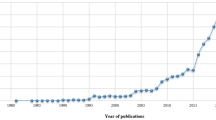Abstract
A number of prior assumptions are needed to develop and consolidate any method for monetizing social value. Those assumptions may be implicit or explicit. We believe that explicitly expressing the assumptions that underlie the proposal for monetization is an essential step in enabling discussion to take place on elements that will be determinant in the resulting model. The model proposed here is based generically on two major research frameworks: the analytic-synthetic method, which consists of splitting a problem into its elementary component parts, analyzing them separately and then integrating them into a relational model; and cost-benefit analysis, which entails analyzing the gap between the inputs used and the outputs obtained, which enables efficiency analysis to be incorporate in the form of a ratio which, in the case of multiple factors, is developed in a Data Envelopment Analyst (DEA) framework. Four assumptions are made here: first, action research as a methodological process, with a mixed working team comprising persons who are active as actors in the organization investigated, in progressive improvement cycles normally on an annual basis. The second assumption is stakeholder theory, so each firm is considered as a network of stakeholders who contribute resources and risks for the joint generation of value which is subsequently passed on to the stakeholders as a whole. Social value, strictly speaking, is the value generated for stakeholders. The third assumption is a phenomenological outlook, under which the value variables identified are quantified in line with the value perceived by stakeholders. The fourth and final assumption is fuzzy logic, i.e. the values identified are not exact scores but centroid guidelines in a set of fuzzy data, on which upper and lower bounds of belonging are imposed.
Access this chapter
Tax calculation will be finalised at checkout
Purchases are for personal use only
Similar content being viewed by others
Notes
- 1.
Cases in point include financial exclusion, food exclusion and lack of access to medicines. Excessive emphasis on the central role of organizations as social actors can also lead to the responsibilities of the state being given up to lobbies.
- 2.
An example can be found in vehicle insurance in Spain: there is a sectoral organization that acts as the policy holder if no insurer will take you as a client (stakeholder). This mechanism for the sectoral integration of non stakeholders can be useful in other types of exclusion in areas such as finances and healthcare.
References
Alzola M (2008) Character and environment: the status of virtues in organizations. J Bus Ethics 78(3):343–357
Carr W, Kemmis S (1986) Becoming critical: education, knowledge and action research. Falmer Press, London
Daly HE, Cobb JB, Cobb CW (1994) For the common good: redirecting the economy toward community, the environment, and a sustainable future (No. 73). Beacon Press, Boston
Davies JT (1973) The scientific approach. Academic Press, London
De Luca A, Termini S (1972) A definition of a nonprobabilistic entropy in the setting of fuzzy sets theory. Inf Control 20(4):301–312
Dembinski PH (2009) Finance: servant or deceiver?. Observatoire de la Finance
Easterby-Smith M, Malina D (1999) Cross-cultural collaborative research: toward reflexivity. Acad Manag J 42(1):76–86
Easterby-Smith MT, Thrope R, Lowe A (1991) Management research: an introduction. Sage, London
Echarri J (1977) El mundo del físico. ed. Universidad de Deusto. Bilbao
Echarri J (1979) Humanismo científico y humanismo natural. Universidad Deusto, Bilbao
Felber C (2012) La economía del bien común. Deusto, Barcelona
Freeman RE (1984) Strategic management: a stakeholder approach. Pitman, Boston
Freeman RE, Harrison JS, Wicks AC, Parmar BL, De Colle S (2010) Stakeholder theory: the state of the art. Cambridge University Press, Cambridge
Friedman M (1962) Capitalism and freedom. University of Chicago Press, Chicago
Friedman M (1970) A theoretical framework for monetary analysis. J Polit Econ :193–238
Gil-Aluja J (1999) Elements for a theory of decision in uncertainty, vol 32. Springer Science & Business Media, Berlin
Gil-Lafuente A (2001) Nuevas estrategias para el análisis financiero de las empresas; Edición 1, Ariel Económica
Giorgi A, Giorgi yB (2003) Phenomenology en Jonathan. In: Smith A (ed) Qualitative psychology. Londres, Sage, pp 25–50
Hurtado I, Toro J (1997) Paradigmas y métodos de investigación en tiempos de cambio. Episteme, Valencia
Hurwicz L (1951) Some specification problems and applications to econometric models. Econometrica 19(3):343–344
Husserl E (1907) Die Idee der Phanomenologie. Fünf Vorlesungen, Hua II’, traducción al español: Edmund Husserl, La idea de la fenomenología. Cinco lecciones, trad. Por Miguel García-Baró, F.C.E., México, Madrid, Buenos Aires 1982
Kaufmann A (1973) Introduction à la théorie des sous-ensembles flous à l’usage des ingénieurs (fuzzy sets theory)
Kaufmann A, Gil Aluja J (1986) Introducción de la teoría de los subconjuntos borrosos a la gestión de las empresas. Santiago de Compostela. Milladoiro, Spain
Mintzberg H, Ahlstrand BW, Ahlstrand B, Lampel J (2005) Strategy safari: a guided tour through the wilds of strategic mangament. Simon and Schuster, New York
Moustakas C (1994) Phenomenological research methods. Sage Publications, London
Ortega y Gasset J (1914) Ensayo de estética a manera de prólogo. Obras completas 6:1941–1946
Ostrom E (1990) Governing the commons: the evolution of institutions for collective action. Cambridge University Press, Cambridge
Ostrom E (1999) Coping with tragedies of the commons. Annu Rev Polit Sci 2(1):493–535
Reason P, Bradbury H (eds) (2007) Handbook of action research, 2nd edn. Sage, London
Retolaza JL, San-Jose L (2011) Social economy and stakeholder theory, an integrative framework for socialization of the capitalism. CIRIEC-España, Revista de Economía Pública, Social y Cooperativa 73:193–213
Retolaza JL, Ruiz-Roqueñi M, San-Jose L (2015) An innovation approach to stakeholder theory: application in Spanish transnational corporations. Revista Brasileira de Gestao de Negocios
Rifkin J (2014) The zero marginal cost society: the internet of things, the collaborative commons, and the eclipse of capitalism. Palgrave Macmillan, London
Ruiz-Roqueñi M, Retolaza JL (2012) Stakeholder marketing: a new orientation in the discipline and practice of marketing. J Mod Account Auditing 8(6):811–826
Samuelson PA (1954) The pure theory of public expenditure. Rev Econ Stat :387–389
Sison AJG, Fontrodona J (2012) The common good of the firm in the Aristotelian-Thomistic tradition. Bus Ethics Q 22(02):211–246
Spencer H (1896) Principles of ethics. D. Appleton & Company, New York
Spencer L, Schmidpeter R (2003) SMEs, social capital and the common good. J Bus Ethics 45(1–2):93–108
Sugeno M (1977) Fuzzy measures and fuzzy integrals, a survey. In: Gupta MM, Saridis GN & Gaines BR (eds) Fuzzy automata and decision processes. North-Holland, New York, pp 89–102
Wittgenstein L (1988) Investigaciones filosóficas. Crítica, Barcelona
Yager RR (1988) On ordered weighted averaging aggregation operators in multicriteria decision making. IEEE Trans Syst Man Cybern 18(1):183–190
Zadeh LA (1965) Fuzzy sets. Inf. Control 8:338–353
Zadeh LA (1997) Toward a theory of fuzzy information granulation and its centrality in human reasoning and fuzzy logic. Fuzzy Sets Syst 90(2):111–127
Zimmermann HJ (1978) Fuzzy programming and linear programming with several objective functions. Fuzzy Sets Syst 1(1):45–55
Author information
Authors and Affiliations
Corresponding author
Rights and permissions
Copyright information
© 2016 The Author(s)
About this chapter
Cite this chapter
Retolaza, J.L., San-Jose, L., Ruíz-Roqueñi, M. (2016). Methodological Proposals. In: Social Accounting for Sustainability. SpringerBriefs in Business. Springer, Cham. https://doi.org/10.1007/978-3-319-13377-5_4
Download citation
DOI: https://doi.org/10.1007/978-3-319-13377-5_4
Published:
Publisher Name: Springer, Cham
Print ISBN: 978-3-319-13376-8
Online ISBN: 978-3-319-13377-5
eBook Packages: Business and ManagementBusiness and Management (R0)




